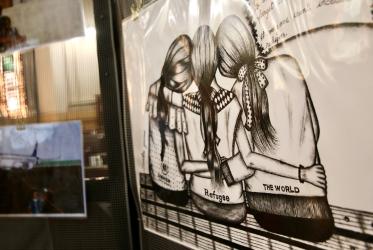A regional training workshop, “Statelessness in the Caribbean Context: Prevention, Reduction and Protection,” was held from 6-9 May in Willemstad, Curacao.
Nearly 30 participants from the Caribbean region - including Barbados, Curaçao, Bahamas, Cuba, Dominican Republic, Haiti, Jamaica, and Suriname - as well as North America gathered with global experts on statelessness at the the United Protestant Church in Curaçao.
They were determined to raise awareness about the issue of statelessness, its implications on the livelihood of individuals, families and communities, and attempt to discern possible avenues of ecumenical collaboration to address this challenge that affects the lives of millions worldwide.
“The Caribbean and North America Council for Mission (CANACOM) over many years have worked together to interpret mission in ways that lead to justice and peace,” said Jennifer Martin, education in mission secretary at CANACOM and co-moderator of the World Council of Churches (WCC) Reference Group for the Pilgrimage of Justice and Peace. “Our mission priorities segue quite readily into the aims of the WCC Pilgrimage of Justice and Peace.”
Workshop participants discussed the huge gap between law and practice related to statelessness, a situation that was quite moving, said Rev. Karin van den Broeke, moderator of the general synod of the Protestant Church in the Netherlands and a member of the WCC Central Committee.
“Nationality is a human right, but there are numerous paths to statelessness,” she said. “Churches have the opportunity to map stateless people, to support them and to prevent new cases of statelessness.”
The United Protestant Church in Curaçao expressed its appreciation for hosting the workshop. “We are grateful that the global ecumenical family has chosen our church as the venue to deliberate on the issue of statelessness, a challenge to many people and communities in the region as well as worldwide,” said Brother Ralph James, president of the United Protestant Church in Curaçao.
Nicolás Sosa, who serves as a commissioner on the WCC Commission of the Churches on International Affairs, said that, as a third-generation descendant of migrants, he suddenly felt vulnerable because this situation could easily happen to him if his government adopted discriminatory nationality law. “It is therefore a responsibility of everyone to speak out on behalf of stateless people who have been told they don’t belong anywhere,” he said.
Semegnish Asfaw, WCC programme executive, added: “Churches have the opportunity to play an important role in speaking the truth to power by challenging unjust structures and policies that cause statelessness, as well as in speaking on behalf of these marginalised and legally invisible people and communities.”







